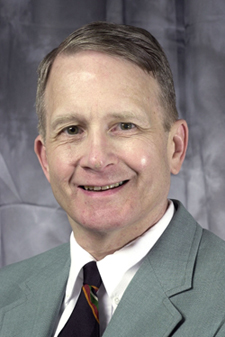
NASHVILLE, Tenn. – John “Jack” H. Venable, who ably served Vanderbilt University as a teacher and administrator for more than three decades, died July 16 after a long illness. He was 74.
“Jack Venable was deeply devoted to the college and to the university, willing to step in whenever and wherever there was a need for his expertise and leadership,” said Vanderbilt Chancellor Nicholas S. Zeppos. “He served the university nobly both as an outstanding teacher and as a skilled administrator.”
Venable was dean of Vanderbilt University’s College of Arts and Science, emeritus, and professor of biological sciences, emeritus. He also spent time as an associate dean of the College of Arts and Science and associate provost for faculty affairs during his Vanderbilt career.
“He was a force to be reckoned with,” said M. Francille Bergquist, an associate dean in the College of Arts and Science. “[lquote]He was a big tall guy, lanky and lean, and had a way of inspiring people to do the right thing.”[/lquote]
Venable earned his Bachelor of Science in physics from Duke University in 1960 and the Master of Science in 1963 and Ph.D. in 1965, both in biophysics, from Yale University. He then spent two years as a visiting scientist at King’s College, University of London.
Venable joined the Vanderbilt faculty in 1967 as an assistant professor of biological sciences and earned tenure in 1972. He was passionate about teaching and was a mainstay in developing and teaching the introductory course in molecular biology.
Venable was honored in 1980 with the Ellen Gregg Ingalls Award for Excellence in Classroom Teaching, and even after he went into administration, he continued to instruct introductory and upper division offerings in molecular biology and to advise and tutor undergraduates.
In 1981, he was appointed associate dean of the College of Arts and Science and began more than two decades of continuous, distinguished service in college and university senior administration. His “steel-trap” memory and networking skills made him a particularly effective administrator, said George Sweeney, an associate dean of the College of Arts and Science.
Venable directed Vanderbilt’s switch to an online class registration system and oversaw the creation of the Center for Teaching in the College of Arts and Science and then its expansion to serve all of Vanderbilt. He also hired the first director of Vanderbilt’s Learning Center. He helped create the Summer Academic Orientation program, which brought incoming first-year students to campus each June for two days of orientation. He also helped create the College of Arts and Science Honors Scholar program.
“Jack was an extraordinary guy, enormously bright,” said Robert Baldwin, professor of art and art history, emeritus. “He was quiet and thoughtful, but always thoroughly did his homework on any issue facing the college.”
In 1992, Venable was appointed acting dean of the College of Arts and Science and became associate provost for faculty affairs a year later. He remained in that office until 2000, when he agreed to serve as dean of the College of Arts and Science while the university conducted a national search for a successor to the retiring Ettore “Jim” Infante. Venable served as dean until July 1, 2001, when Richard McCarty was named to the position. Venable was awarded emeritus status in May 2002.
Venable’s research interests lay at the interface of the physical and biological sciences. He applied physical techniques to gain insights on the structures and functions of biological macromolecules and macromolecular assemblies. This interdisciplinary approach to science, considered unusual at the time, drew attention to the results of his research as it appeared in a wide range of prestigious journals such as Nature, the Journal of Molecular Biology, the Journal of the American Chemical Society and the Journal of Chemical Physics.
He was a member of Phi Beta Kappa, Omicron Delta Phi, Sigma Xi, the Biophysical Society and The American Association for the Advancement of Science. He was an avid woodworker and enjoyed traveling.
Survivors include wife Alys, daughter Carol and two grandchildren. Visitation with the family was set for 2-4 p.m. July 21 at Marshall-Donnelly-Combs Funeral Home. Interment will be in Georgia.